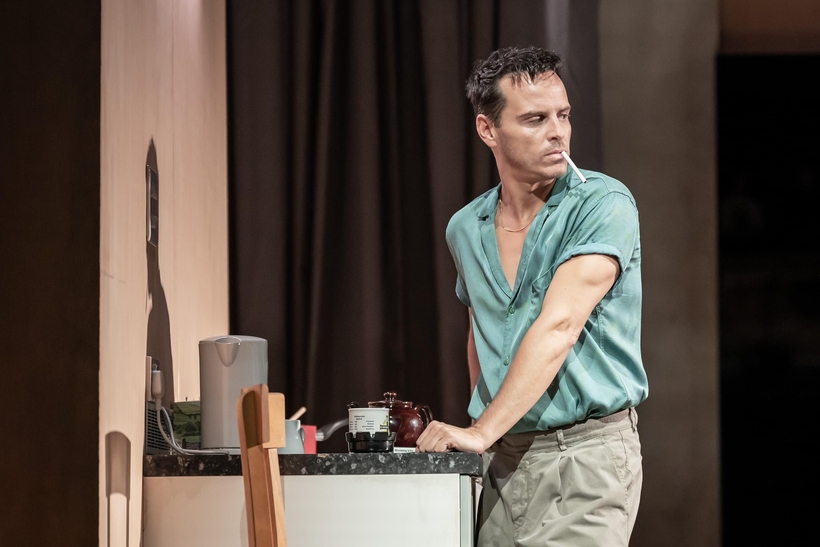In an age preoccupied with identity politics, the actor Andrew Scott has a rival issue on his mind. “I think transformation is as important as representation,” Scott told The Guardian in September 2023, ahead of a month’s run of the one-man Vanya in London’s West End, where it was captured live on video. A limited Off Broadway transfer opens on March 11.
It’s Anton Chekhov’s Uncle Vanya, transposed to present-day Ireland. Dig that brogue! A native Dubliner, Scott shares billing as “co-creator” with the director Sam Yates, the designer Rosanna Vize, and the British-Irish playwright Simon Stephens, who has streamlined the original to a fleet two hours (no intermission).
As for the setting, a bare stage closed off with draped floor-to-ceiling mirrors evokes a rehearsal studio with a doorway here, a piano there, a swing hung from the flies, and a working sink, handy when a guy needs a glass of water. Turned out with the fashion flair of a techie and overdue for a shave, Scott works the space the way a card sharp works his deck.
Just like that, he juggles eight roles. The big cheese of the household, mocked behind his back as “Alexander the Great,” is a washed-up film director (in Chekhov a professor of aesthetics), still playacting the genius. His captive audience includes his selfless Plain Jane daughter, his bored-to-tears trophy wife, and his first wife’s brother—Plain Jane’s uncle Ivan (no Russian diminutive for him!)—who’s had it up to here. Stepmother and stepdaughter vie for the affection of a physician and lapsed idealist who self-medicates with drink. A grandmama, a granny housekeeper, and a bankrupted neighbor who quietly hangs around for handouts fill out the cast list.
In London, the off-the-charts entertainment value of Scott’s histrionics rated an Olivier Award. Yet to some, this was Chekhov Lite, deficient in tragic nuance. Never mind that the playwright thought of Uncle Vanya and his other late masterpieces as comedies—comedies, we might add, of the absurd.
But comic or tragic labels may miss the point. Ever since Konstantin Stanislavsky’s revolutionary reign at the Moscow Art Theatre when these works were new, the serious actor’s mission has been to take possession of a role, fuse with it, and live its truth in performance. That, pretty much, is “The Method.” Taking a quantum leap into dramatic hyperspace, Scott honors the ideal without getting trapped in systems.
The tics and inflections he uses as leitmotifs help keep the characters in focus, but the moments that blaze in our imagination are the moments of spontaneous impulse. Thought washes across Scott’s face like cat’s-paws over a pond or squalls over the ocean. Surging passion sets his eyes aglitter and his limbs to wild flourishes of movement. In the space of a few lines of text, he can conjure up one person for us to look at, another for us to listen to, and perhaps a third we sense in the empty air. At need, he lends two characters possession of his body at the same time, grappling for a bottle, or swept away with desire.
What Scott never does is paint by numbers. A household disintegrates, crushed by personal failures and the iron fist of history. In flashes, we see it all.
Vanya is available for streaming on the National Theatre at Home platform. The play will go up at the Lucille Lortel Theatre, in New York from March 11 to May 4
Matthew Gurewitsch writes about opera and classical music for AIR MAIL. He lives in Hawaii

